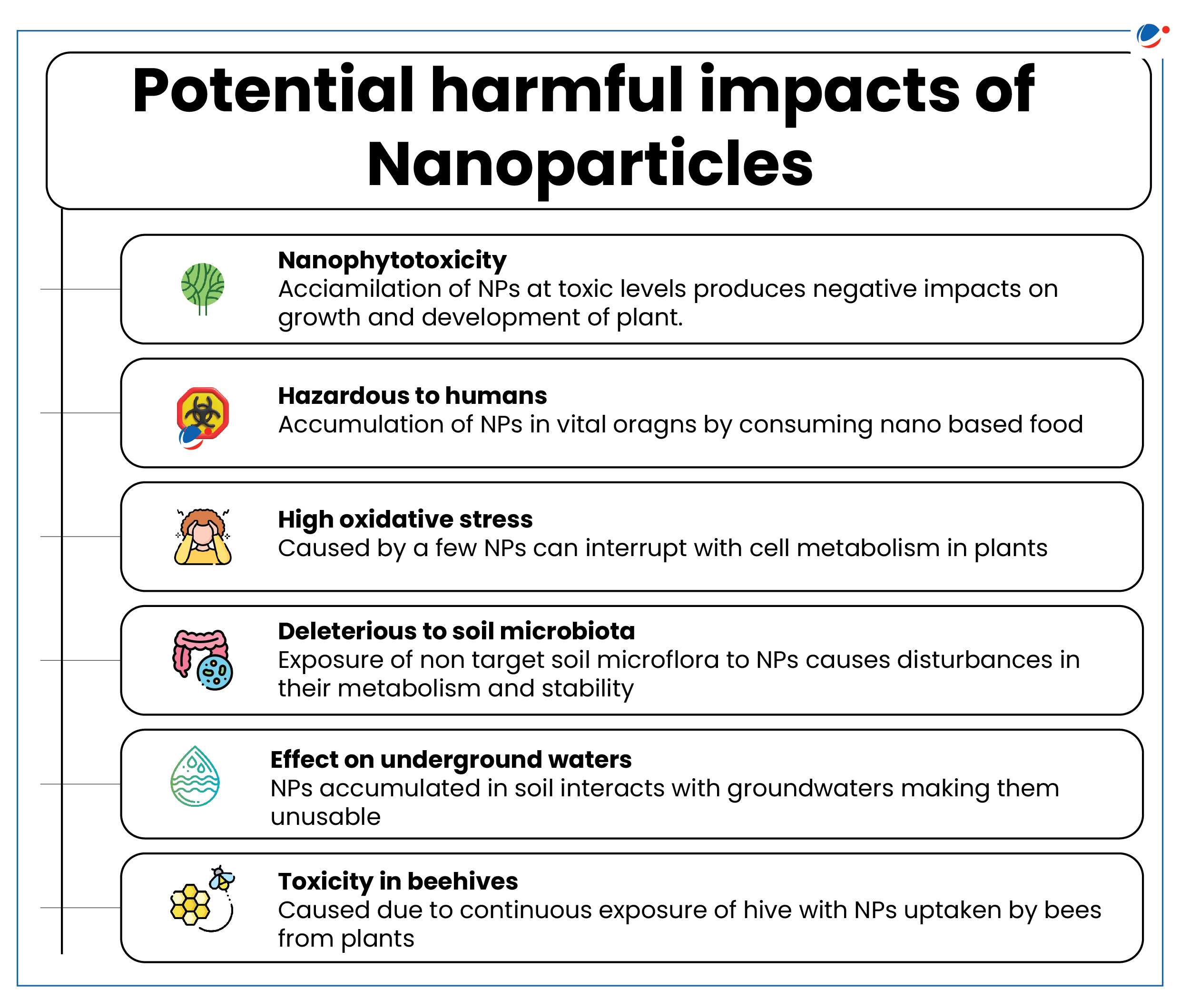Why in the news?
Indian Farmers Fertiliser Cooperative Limited (IFFCO) got the Fertiliser (Control) Order, 1985 (FCO) approval for Nano Zinc and Nano Copper liquids.
More about the news
- These Nanofertilisers would help to address effectively the deficiency of micronutrients zinc and copper in agriculture.
- Nano fertilisers are nutrients that are encapsulated within a nanomaterial in order to enable controlled release, and its subsequent slow diffusion into the soil.
- Significance of Zinc and copper micronutrients in agriculture:
- Zinc: Enzyme functioning in plants, plant growth and development etc.
- Copper: Enzymatic activities in plants and chlorophyll and seed production
- Earlier, IFFCO's nano-liquid urea and nano-liquid Di-Ammonia Phosphate (DAP) were also approved under FCO.
- FCO is administered by Dept. of Agriculture Cooperation under the Essential Commodities Act, 1955.
- It lays down as to what substances qualify for use as fertilizers in the soil, procedure for obtaining license, etc.
- The approval of these nano fertilizers highlights the increasing use of nanotechnology in agriculture.
About Nanotechnology
- Nanotechnology involves working with materials and devices at the nanoscale, typically ranging from 1 to 100 nm in size.
- Need of Nanotechnology in Indian Agriculture
- Indian agriculture fatigued after the Green Revolution: Nutrient use efficiency has declined, and crops are not responding to added nutrients such as fertilisers.
- Environmental Damage: The unbalanced and non-judicious application of fertilizers has caused damage to croplands and natural water bodies.
- E.g., excessive use of subsidized urea disrupts groundwater, causes eutrophication, and deteriorates soil health.
- Food and Nutritional Security Challenges: Achieving food security amidst climate change is challenging, with multi-nutrient deficiencies in Indian soils, requiring an efficient input delivery and management system.
- Overcoming other issues in Indian agriculture: Such as pests and diseases causing substantial crop losses, shortage of water and post-harvest due to spoilage.
Applications of Nanotechnology in Agriculture
- Nanofertilizers: They can enhance nutrient uptake by plants with 90-100% utilization efficiency, improving crop yields.
- Nanopesticides: They can deliver active ingredients to pests in a targeted manner, reducing the amount of chemicals needed and minimizing collateral damage to non-target organisms.
- E.g., Nano Silver is known to have strong bactericidal and broad spectrum antimicrobial activities.
- Nanobiosensors: They can monitor soil conditions, crop health, and environmental factors with high precision and provide real-time data to farmers for informed decision making with respect to a irrigation, nutrient application, and pest control.
- Nanomaterials for Soil Improvement:
- Nanoparticles of clay: To improve soil structure, water retention, and nutrient-holding capacity.
- Nanomagnets: For removal of soil contaminants.
- Remediation: Nanoparticles can help in pollution sensing and remediation of contaminated agricultural lands.
- E.g., Photocatalysis uses UV-activated nanoparticles to degrade pollutants efficiently.
- Crop Protection: Applying silica nanoparticles to leaves shield plants from high temperatures and intense UV radiation.
- Nanotechnology in Crop Breeding: It can aid in the development of genetically modified crops by enabling precise manipulation of plant genes at the nanoscale.
- Nano-fibre arrays: Can deliver genetic material to cells quickly and efficiently.
- Single walled carbon nanotubes (SWNTs): Can serve as effective nanotransporters to deliver DNA and small dye molecules into plant cells, thus can be used as small treatment delivery systems in plants.
- Nanotechnology in Food Processing:
- Food Packaging and Preservation: Nanomaterials such as nanocomposites can be used to create antimicrobial and oxygen-barrier coatings to reduce spoilage and food waste.
- Food safety: Scientists have successfully used single bacterial cells to make tiny bio-electronic circuits, which could in the future be used to detect bacteria, toxins and proteins.

Conclusion
Nanotechnology offers promising applications in agriculture, potentially revolutionizing crop production and management. However, challenges remain, including potential environmental and health risks associated with nanoparticles. Thus, we need to develop regulatory frameworks to ensure the safe and responsible development and use of nanomaterials in agriculture. Proper Risk Assessment can be conducted as suggested in the guidelines by the Department of Biotechnology (DBT), and FCO order 2021.
Government Initiatives on Nanotechnology in Agriculture
|



